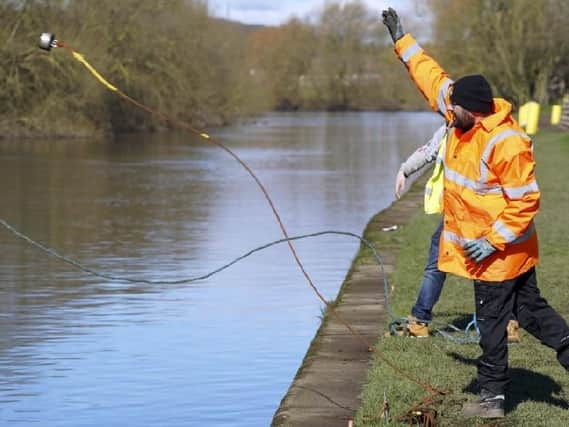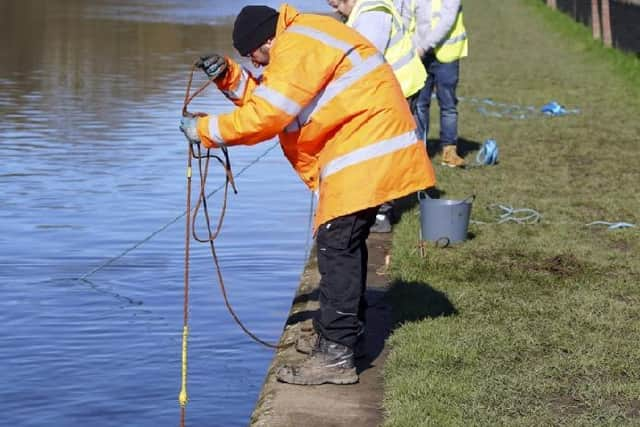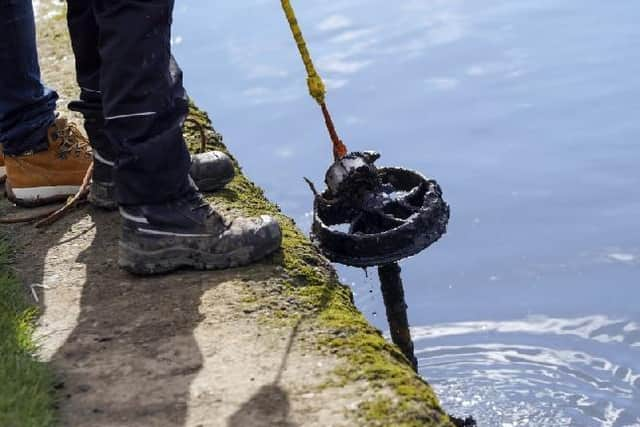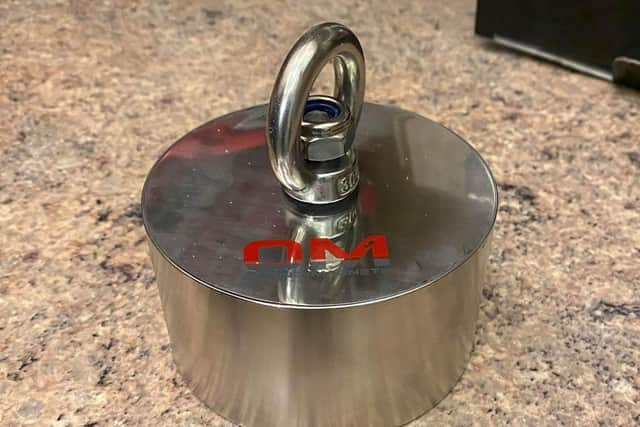Magnet fishing: Hundreds in the district now hooked on fast-growing hobby


When it comes to magnet fishing, one of the UK’s fast-growing hobbies, it’s fair to say publicity has not been kind.
As the title suggests, it’s simply using a magnet to hook metallic items out of rivers, canals and lakes, and is continuing to reel in participants across the Wakefield district.
Advertisement
Hide AdAdvertisement
Hide AdJoe Siviter, from Castleford, has been regularly ‘fishing’ the waterways for three years, and says interest has rocketed from just a handful to hundreds of like-minded enthusiasts. He even runs a Facebook group called ‘Magnetised’ that has more than 500 members.


Despite this, he says negative press persistently casts a shadow over magnet fishing.
Tales of guns, grenades and war-time bombs being salvaged often hit the headlines, and the tragedy of a father and son who drowned in Huddersfield in 2018 brought its potential dangers into sharp focus.
Enthusiasts have been unfairly dismissed as shady scrap metal merchants, pushing the law to breaking point for a few quid.
Advertisement
Hide AdAdvertisement
Hide AdThen there’s the Canal & River Trust, which refuses to condone the activity.


Mr Siviter, however, wants to set the record straight.
The 32-year-old, who works for the waste management firm, Renewi, said: “There’s been a lot of bad press, people have called us water gypsies but it’s just stereotyping.
It’s basically metal detecting, but under water.
“Usually you only hear about magnet fishing when someone finds a bomb or a grenade, but none of us want to find them. Then you hear about accidents happening.


“There can be dangers to it, but there are with everything.”
Advertisement
Hide AdAdvertisement
Hide AdMr Siviter, a father-of-two, says the real dangers come when anglers decide to climb into the water, so he chooses to magnet fish from the safety of the bank.
He trawls the waterways in Allerton Bywater, Castleford, Knottingley and Wakefield on his days off.
So what exactly is the thrill?
Far from using the hobby as a way of making money, Mr Siviter says the anticipation of finding what lurks beneath the surface, and the promise of its historical significance are what keeps him, and many others, coming back.
He said: “The first day I tried it I was rubbish, I did 10 hours and ended up soaking wet and all I pulled out was an old PC keyboard.
Advertisement
Hide AdAdvertisement
Hide Ad“But I kept doing it because of the anticipation of what I could pull up.
“You can go regular fishing for 10 hours and not catch anything.
“With magnet fishing, when you drop the magnet and you feel it grab onto something, you don’t know what you’re going to pull up.”
He says the canal bed at Allerton Bywater is “riddled” with mining artefacts, relics from the area’s 500-year-long connection to the coal industry.
Advertisement
Hide AdAdvertisement
Hide AdThis includes hammers, chains, hooks and enough parts to fully assemble mining carts.
His discoveries constantly attract the attention of passers by, and also gives him a chance to perhaps hook a new magnet angler.
“A lot of people stop and ask me what I’m doing,” he said.
“I always have spare magnets with me so they can have a go and maybe get them into it.”
Despite the growing interest, the Canal & River Trust remains, according to its website, opposed.
Advertisement
Hide AdAdvertisement
Hide AdThe Express asked the trust for a response, but it failed to reply, however, its website states: “It’s great that people are interested in getting rubbish out of the canal, however we don’t allow magnet fishing as it can be extremely dangerous.”
Whether this amounts to magnet fishing being strictly illegal, remains uncertain.
An old byelaw dating back to 1955 does state that removing items from canals is prohibited.
In more recent years, there was also talk of magnet anglers facing a £25 fine if caught, but Joe Siviter says despite thousands enjoying the hobby every day, he has never come across anyone who has been hit with the levy, or even being ordered to stop.
Advertisement
Hide AdAdvertisement
Hide AdThe trust even carried out a trial in Yorkshire to explore how they could permit magnet fishing, although the results are unknown.
Mr Siviter says he and others have approached the trust, but without any meaningful response.
He suggests a permit system, like with regular fishing, would be one solution, should the trust wish to begin regulating magnet fishing.
“It is a grey area,” admitted Mr Siviter.
“We think they want to control it. We hope they will just introduce permits, but nobody knows what they’re doing.
Advertisement
Hide AdAdvertisement
Hide Ad“If they saw how much metal there is in the river, they’d realise that we are doing them a favour. We’re basically cleaning it for them.”
The special neodymium magnets used in magnet fishing can be bought online for as little as £20 or £30.
More powerful magnets can set you back more than £200, but they are capable of lifting a tonne or more.
Tied to a length of sturdy rope, the magnet is dropped into the water to sink, then reeled in. Unlike regular fishing, it’s uncommon for anglers to come away empty handed.
The dangers of sharp metal is well documented, but the real dangers come from when anglers climb into the water to retrieve an object or the magnet if it becomes entangled on the river bed.